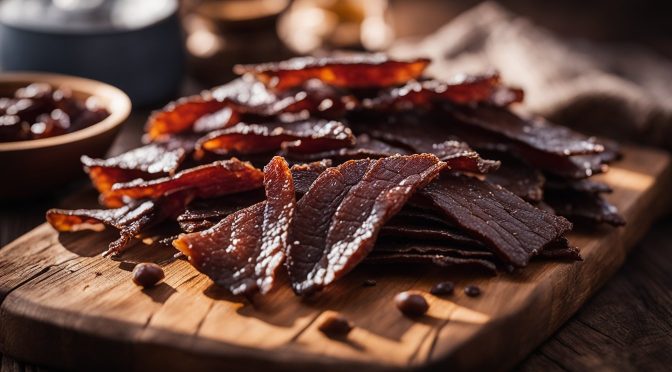In the world of bodybuilding, protein stands as a cornerstone nutrient essential for muscle growth and repair. Your body needs sufficient protein to fuel the recovery process after a grueling workout and to help build lean muscle mass.
High-protein snacks are a good way to meet these needs. This is especially true when time or lifestyle demands make full meals less practical.
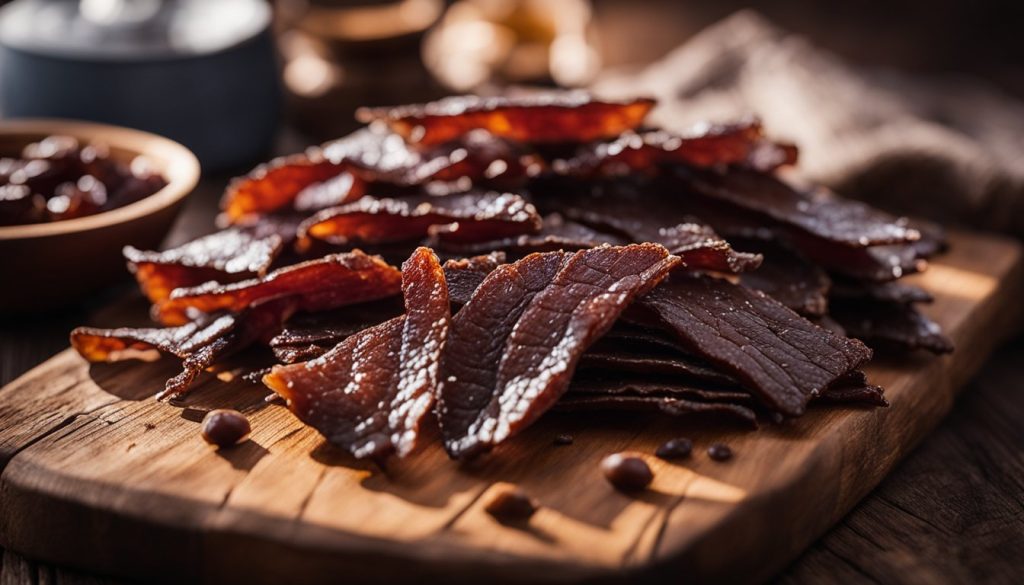
Choosing high-protein snacks can help. They should also have healthy fats and be low in calories. This can boost your bodybuilding efforts. These nutrients support muscle. They also give lasting energy.
Eating these snacks helps fuel your body well. It does so for both immediate and long-term gains.
When you opt for snacks rich in protein, you’re setting the stage for effective bodybuilding results. Aim for snacks that offer a balance of nutrients with a focus on quality protein sources. This strategy supports your body’s anabolic processes. It also fosters an environment for muscle growth.
By selecting the right foods, you align your nutrition with your fitness goals, paving the way for a stronger, more sculpted physique.
Source of Protein
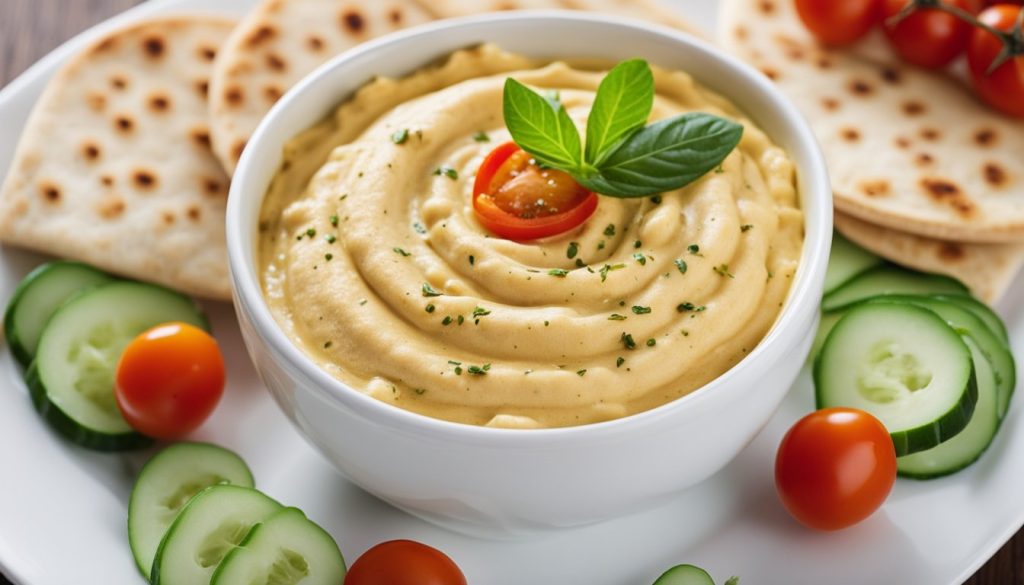
Protein is a crucial macronutrient that fuels your muscle growth and aids in repair. It is pivotal for your body’s metabolism and maintaining healthy tissue.
Definition and Importance of Protein as a Macronutrient
Amino acids compose protein, which builds your muscles and is vital for various bodily functions. Protein is a macronutrient. It plays a key role. It helps build, fix, and maintain your body’s tissues, including muscle. Amino acids are in protein. Your body needs them for energy, metabolism, and cells.
Different Sources of Protein
Animal-Based Protein
Animal-derived foods are great sources of high-protein. They contain all the amino acids your body needs. These include:
- Meat: Beef, pork, lamb, canned tuna and poultry
- Dairy: Milk, cheese, yogurt
- Eggs: A versatile option rich in protein
These sources also provide key vitamins and minerals. These include iron, calcium, and B-vitamins. They are vital for your body’s function.
Plant-Based Protein
Plant-based proteins are becoming increasingly popular due to dietary preferences and sustainability concerns. Some primary plant sources are:
- Beans and Legumes: Kidney beans, lentils, chickpeas
- Nuts and Seeds: Almonds, peanuts, pumpkin seeds, flaxseeds, chia seeds
- Soy Products: Tofu, tempeh, edamame
Most plant-based proteins are not complete (missing one or more essential amino acids). But, eating a variety of these high-protein foods can ensure you get all the amino acids your body needs. These protein-rich foods also contribute additional nutrients, including fiber for digestion.
Protein Intake
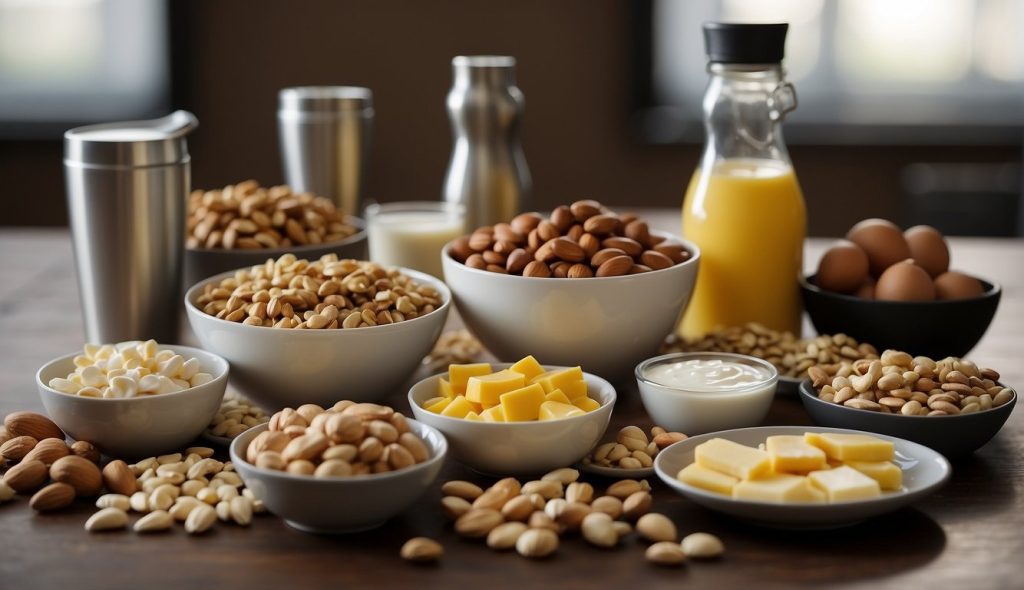
When embarking on a bodybuilding regimen, precise protein intake is vital to support muscle mass growth and repair. Your protein needs depend on multiple factors such as age, body weight, and specific fitness goals.
Recommended Daily Intake for Bodybuilders
Bodybuilders need much more protein than the average person. This is because of intense training to gain muscle tissue and strength. The general recommendation for bodybuilders is to consume between 1.4 to 2.0 grams of protein per kilogram of body weight each day. This intake supports the maintenance and growth of muscle mass and aids in recovery.
- Age and lifestyle also influence the amount of protein necessary.
- The presence of all essential amino acids in your diet is important for the synthesis of new proteins.
Calculating Protein Needs Based on Body Weight and Fitness Goals
Tailor your protein intake to your bodybuilding goals. Calculate your needs based on your body weight and the intensity of your fitness regimen.
For instance, if you weigh 80 kilograms and aim to gain muscle, your daily protein requirement could be up to 160 grams. Here is a simplified table for guidance:
| Fitness Goal | Protein/kg of Body Weight | Daily Protein for 80kg Individual |
|---|---|---|
| Maintain Mass | 1.4g | 112g |
| Gain Muscle | 2.0g | 160g |
| Weight Loss | 1.6-2.4g | 128-192g |
- Adjust your intake as needed with the help of a dietitian, especially if you’re aiming for weight loss without sacrificing muscle.
- Get your protein from whole foods. Use shakes or powder if needed.
- Keep track of your calorie intake to ensure you’re not exceeding your daily caloric needs, as excess calories can lead to fat gain rather than muscle.
Grams of Protein
When picking high-protein snacks for bodybuilding, it’s key to know how to measure protein and read nutrition labels. This ensures you’re meeting your dietary needs.
Measuring Protein Content in Snacks
To maximize your muscle-building goals, you need to be cognizant of the protein content in each snack you consume. For example, you can find snacks such as:
- Jerky: 9 grams of protein per 1 ounce serving
- Cheese: 7 grams of protein per 1 ounce serving
- Nuts: Typically 6 grams of protein per 1 ounce serving
- Yogurt: Around 10 grams of protein per 100g serving
These convenient snacks provide protein. They also vary in calories, fat, sugar, and fiber. This makes them versatile options for your nutrition plan.
Reading Nutrition Labels for Protein Content
It’s important you know how to read nutrition labels to accurately track your protein intake. Look for the ‘Nutrition Facts’ panel and find the ‘Protein’ line, usually listed in grams. Here’s what you might see for:
- Jerky: Protein: 9g
- Cheese: Protein: 7g
- Nuts: Protein: 6g
- Yogurt: Protein: 10g
Compare this number to the serving size listed at the top of the label to understand how much protein you are getting per serving. Also, pay attention to other nutritional information such as calories, fat, sugar, and fiber to ensure a well-rounded diet.
Protein Bar
Protein bars offer a handy nutrition boost. They are especially useful for bodybuilders who want more protein on the go. They provide a balance of protein, healthy fats, and fiber to sustain energy and satiety between meals.
Benefits of Protein Bars
Satiety: Protein bars can help you feel full longer due to their high protein and fiber content. Incorporating ingredients like nuts and seeds, they can be a great snacking option to curb hunger and prevent overeating.
High-quality protein bars pack essential nutrients. They usually contain a mix of proteins, healthy fats from sources like nuts, and fiber. These nutrients support muscle growth and recovery.
Choosing a Protein Bar
Ingredients: Look for bars with whole food ingredients like nuts, seeds, and minimal added sugar. Your goal is to find a bar that’s as close to natural as possible.
Nutritional Profile:
- Protein: Aim for bars with at least 10-20 grams of protein, which is sufficient for muscle repair and growth.
- Fiber: Higher fiber content ensures better digestion and prolonged satiety.
- Sugar: Always check the sugar content. Opt for bars low in sugar to avoid unnecessary calories.
- Calories: Consider the calorie content, especially if you’re tracking your daily intake for muscle gain or fat loss.
Convenience & Portability: Designers create protein bars to be easy to carry. They are a hassle-free perfect snack that you can keep in your bag. You can eat them before or after your workouts.
Greek Yogurt
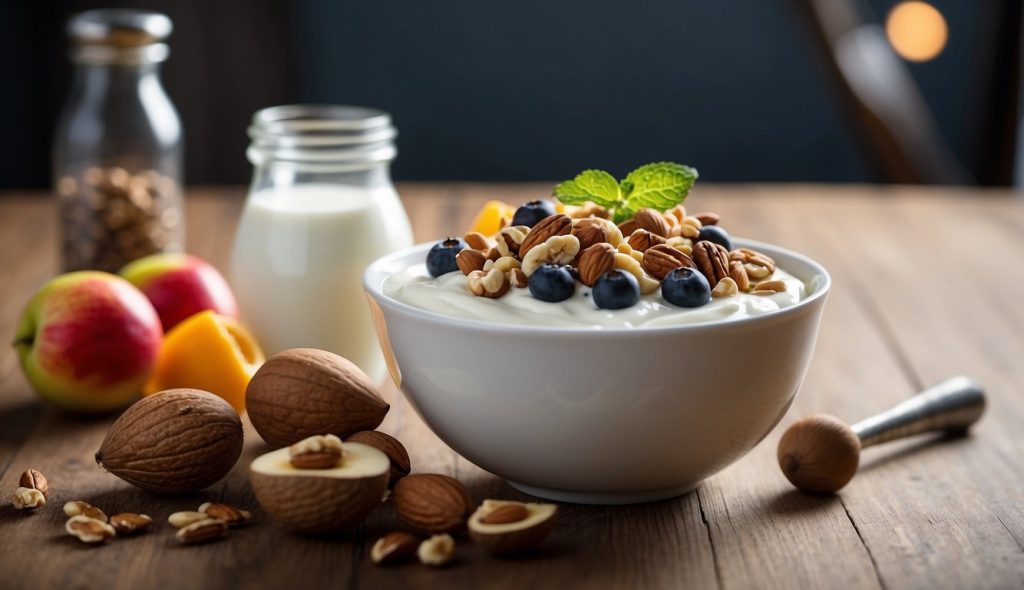
Greek yogurt is a nutritious high-protein snack. It is perfect for bodybuilders. They eat it to feed their muscles and support recovery. It is a thicker, creamier version of regular yogurt, providing a satisfying option for your high-protein diet.
Nutritional Benefits of Greek Yogurt
Greek yogurt is a superior dairy product that offers an impressive profile of vitamins and minerals. It is particularly rich in protein, which is essential for muscle repair and growth. A serving can pack about twice as much protein as traditional yogurt, making it an ideal snack for bodybuilders.
- Protein Content: Offers around 15-20 grams of protein per 6-ounce serving.
- Calcium: Essential for bone health, Greek yogurt contains about 10% of your daily value in a typical serving.
- Probiotics: It includes beneficial bacteria that can aid in digestive health.
Greek yogurt has important vitamins. They include B12, which helps form red blood cells and supports the nerves. It is also a source of potassium, which is vital for muscle and nerve function.
Here’s a snapshot of the nutritional value of Greek yogurt:
| Nutrient | Benefit |
|---|---|
| Protein | Supports muscle growth and repair. |
| Calcium | Important for strong bones. |
| Probiotics | Enhances gut health. |
| Vitamins B12 | Helps produce red blood cells. |
| Potassium | Crucial for muscle and nerve function. |
Choosing Greek yogurt means you’re opting for a healthy snack. It complements your bodybuilding efforts and contributes to your well-being. Incorporating this high-protein dairy delight into your snacks can help you meet your fitness and health goals.
Healthy Protein Snacking Options
When focusing on bodybuilding, incorporating high-quality-protein snacks into your routine is crucial.
Nuts and seeds serve as excellent sources of protein and healthy fats. A handful of almonds can quickly boost your energy and provide substantial protein content.
Fruit may not be your primary source of protein, but it can complement other protein-rich snacks. Pairing fruits like apples or bananas with nut butter enhances the protein content, making it a balanced snack for bodybuilders.
Vegetables are low-calorie options packed with vitamins and minerals. Dip veggies like carrot sticks or bell peppers in hummus for a satisfying snack that includes protein from the chickpeas.
Whole-grain crackers are fiber-rich. When topped with high-protein foods like cheese or peanut butter, they can help meet your body’s protein needs.
To enjoy the benefits of soy protein, you can opt for edamame, which are young soybeans. These perfect snacks are delicious, full of protein, and you can season them to your preference.
Lastly, creating your own trail mix allows for a customizable snacking option. Mix your favorite nuts, seeds, and a little dried fruit for a portable snack.
Here’s a simple table summarizing protein-rich snack options:
| Snack Type | Suggested Combination |
|---|---|
| Nuts & Seeds | Handful of almonds or homemade trail mix |
| Fruit & Nut Butter | Apple slices with almond butter |
| Vegetables & Dip | Carrot sticks with hummus |
| Whole-Grain Snacks | Whole-grain crackers with peanut butter |
| Soy Products | Steamed or chilled edamame |
Supplements for Protein Intake
When bodybuilding, you must ensure you get enough protein. It’s crucial for muscle recovery and growth. Supplements can effectively meet your high protein needs.
Whey protein is one of the most popular choices due to its fast absorption and high concentration of essential amino acids.
On the other hand, casein protein digests slowly, making it ideal for consuming before bed to aid with muscle recovery overnight.
For those who prefer plant-based options, vegan protein powders are available. They get protein from sources like peas, hemp, and brown rice. These can be just as effective as animal-based ones. But, only if you combine them correctly to ensure all necessary amino acids are present.
Adding these proteins to a shake or smoothie makes a handy recovery drink or meal replacement.
Here’s a simple guide to start using these supplements:
- Choosing Your Protein:
- Whey: Opt for after workouts.
- Casein: Best before sleep.
- Vegan: Ensure it’s a complete protein blend.
- Making a Protein Shake/Smoothie:
- Select your protein powder.
- Add liquid (water, milk, plant-based milk).
- Include fruits, nuts, or seeds for added nutrients.
- Blend until smooth.
Remember, protein supplements are handy. But, they should not replace whole food sources of protein. They should instead add to your balanced diet.
Adjust the supplement serving sizes as needed. Do this to fit your diet and workout.
High Protein Snacks for Bodybuilding Frequently Asked Questions
Q: What are high-protein snacks for body builders?
A: Bodybuilders eat high-protein snacks. They have options. These include Greek yogurt and protein smoothies. Also turkey and cheese roll-ups, hard-boiled eggs, and cottage cheese with fruit. These popular snacks are not only delicious but also provide the protein your body needs to support muscle growth and recovery.
Q: What are good protein snacks for bulking?
A: Good protein snacks for bulking include options such as protein bars, mixed nuts, beef jerky, Greek yogurt, and cottage cheese. These nutritious snacks are high in protein and can help support muscle growth and recovery during the bulking phase.
Q: Is peanut butter good for building muscle?
A: Yes, peanut butter can be good for building muscle as it is a good source of protein and healthy fats. It also contains essential nutrients such as magnesium, which is important for muscle function. However, it’s important to consume peanut butter in moderation due to its calorie density. Adding peanut butter to a balanced diet can help build muscle. It also improves nutrition.
Q: What are quick snacks for building muscle?
A: Snacks for building muscle are quick. They include protein shakes, Greek yogurt, cottage cheese, hard-boiled eggs, and turkey or beef jerky. These snacks are convenient and high in protein. They can help build and repair muscles. This makes them ideal for people who want quick muscle-building options.
Q: What are the healthiest snacks for bodybuilders?
A: The best snacks for bodybuilders include mixed nuts and Greek yogurt. They should also eat cottage cheese, hard-boiled eggs, and lean turkey or beef jerky. These delicious snacks are high in protein. They also have essential nutrients and healthy fats. These can aid muscle growth and health. Eating these snacks as part of a balanced diet can help with bodybuilding. They are a healthy and effective approach.

